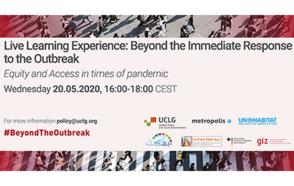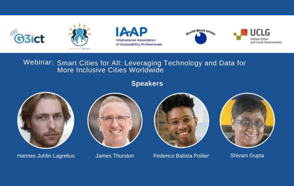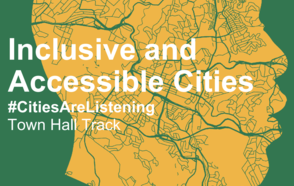
July 24th, 2020 - On July 15th, World Enabled launched the Cities4All document "Empowering Local Governments on Inclusive Pandemic Response" during the Cities4All official HLPF side event, co-organized by The Special Envoy of the UN Secretary-General on Disability and Accessibility, and UNDESA.
The recommendations are inspired by the Principles of the C4All Global Compact on Inclusive and Accessible Cities. The document showcases commitments and proposed actions to promote inclusive pandemic preparedness and resiliency recovery at the local level, including lessons learned and gathered through the Cities4All webinar series and Cities4All Whatsapp Regional Learning Groups. Nineteen organizations contributed as reviewers, including The Special Envoy of the UN Secretary-General on Disability and Accessibility, United Cities and Local Governments, UNHabitat, and the cities of New York, Barcelona, São Paulo, and Abu Dhabi.
● Other reviewer organizations include World Blind Union, Global Disability Innovation Hub, GIZ, BMZ, UNICEF, International Disability Alliance, Humanity and Inclusion, GAP Older Persons PCG, Kipu Llaxta, and CBM.
The COVID-19 outbreak poses a severe threat to global health and the provision of city services. It is radically transforming the societies in which we live. As an ever-increasing number of people live and work in urban environments, the need to support the most at-risk people in our cities is closely tied to the way we choose to reshape, respond and recover from the pandemic.
The COVID-19 uniquely threatens persons with disabilities and older persons, 25% of the world's population, 80% of whom live in low and middle-income countries (LMIC). Persons with disabilities and older persons, depending on underlying health conditions, are at higher risk of contracting COVID-19
Cities4All Equity and Access in Times of Pandemic
World Enabled’s Cities for All Program, from March through May 2020, launched the"Cities4All Equity and Access in times of Pandemic Webinar Series" with the support from GIZ and BMZ, The Special Envoy of the UN Secretary-General on Disability and Accessibility, United Cities and Local Governments, and UNHabitat. The series mobilized and engaged 40 speakers and 2000 city leaders, organizations, and subject matter experts through the Cities for All multi-stakeholder platform from more than 60 countries all over the world. The webinar series allowed to identify emerging issues and to activate six Regional WhatsApp Learning groups in which 600 stakeholders were actively involved by sharing and exchanging more than 5000 resources (e.g., case studies, best practices, data, journal articles, etc.).
 “After nine weeks of convenings with urban leaders from around the world, it became evident that there’s a clear need for more disaggregated and comparable data and local level actions to immediately respond to those most at-risk,”
“After nine weeks of convenings with urban leaders from around the world, it became evident that there’s a clear need for more disaggregated and comparable data and local level actions to immediately respond to those most at-risk,”
Dr. Victor Santiago Pineda, President of World Enabled and a global urban expert leading the Cities for All Platform.
● Victor Pineda’s blog on launch of Recommendations and Building “Cities For All” Post-COVID19
Launching Tools for Data-Driven Approach to Inclusive Pandemic Response
Most of the available globally comparative data, reports, and resources are not localized, not disaggregated by disability, and are not in accessible formats, thus rendering some citizens essentially invisible in current COVID-19 measurements.
Along with the series, the Cities4All Covid-19 "Inclusive and Accessible Cities" Survey was launched, in collaboration with the World Bank, to overcome the "data desert" by generating globally comparative data on the impact of the Pandemic on persons with disabilities and older persons at the local level. 60 % of the survey respondents pointed out a lack of trust in their city government's ability to respond to the needs of persons with disabilities and older persons during the COVID-19 effectively. Also, 70% agree persons with disabilities and older persons face discrimination in local COVID-19 pandemic responses, and 60% disagree their city ensures public facilities and services are accessible to persons with disabilities during the COVID-19 Pandemic.
 Persons with disabilities and older persons are disproportionately affected by COVID-19, as stated by Maria Soledad Cisternas Reyes, the Special Envoy for the UN Secretary-General on Disability and Accessibility, “the Covid-19 pandemic has highlighted the gaps in public policies, legislation, and services concerning the need of being truly inclusive, negatively affecting the human rights and sustainable development of millions of persons in the world.”
Persons with disabilities and older persons are disproportionately affected by COVID-19, as stated by Maria Soledad Cisternas Reyes, the Special Envoy for the UN Secretary-General on Disability and Accessibility, “the Covid-19 pandemic has highlighted the gaps in public policies, legislation, and services concerning the need of being truly inclusive, negatively affecting the human rights and sustainable development of millions of persons in the world.”
● Statement from the Special Envoy for the UN Secretary-General on Disability and Accessibility at the ECOSOC High-level Segment: “Where are we headed? Vision and scenarios for the future of the SDGs after the COVID-19 crisis.”
Learning Groups and Guidelines Empower Local Governments in Pandemic Response
On July 15th, World Enabled published the document "Recommendations Empowering Local Governments on Inclusive Pandemic Response," a series of recommendations inspired by the Principles of the Global Compact on Inclusive and Accessible Cities. It showcases commitments and proposed actions to promote inclusive pandemic preparedness and resiliency recovery at the local level, including lessons learned and gathered through the Cities4All webinar series, the Whatsapp Regional Learning Groups. Fifteen organizations contributed as reviewers, including the cities of New York, Barcelona, São Paulo, and Abu Dhabi.
The network will continue to engage through WhatsApp Regional learning groups and share best practices on policies and programs for safe, accessible, inclusive, and resilient responses to the COVID-19 pandemic.
 “In this moment of the pandemic, it is necessary to have a special look to not leave anyone behind. The city of Sao Paulo has around 1 million persons with disabilities and that is why the city hall has been giving special attention to this population, including those who are homeless and low-income families” Bruno Covas, Mayor of Sao Paulo.
“In this moment of the pandemic, it is necessary to have a special look to not leave anyone behind. The city of Sao Paulo has around 1 million persons with disabilities and that is why the city hall has been giving special attention to this population, including those who are homeless and low-income families” Bruno Covas, Mayor of Sao Paulo.
It is vital that persons with disabilities have an active voice in shaping the post-COVID-19 world.
 “We must learn from the challenges that we are facing now with the COVID- 19 pandemic and strengthen our resolve to build back better and greener, with stronger, more resilient cities and settlements which are inclusive and accessible for all" Maimunah Mohd Sharif, Executive Director of UN-Habitat.
“We must learn from the challenges that we are facing now with the COVID- 19 pandemic and strengthen our resolve to build back better and greener, with stronger, more resilient cities and settlements which are inclusive and accessible for all" Maimunah Mohd Sharif, Executive Director of UN-Habitat.
- Visit the official website www.cities4all.org
- Read the full MEDIA RELEASE here.













